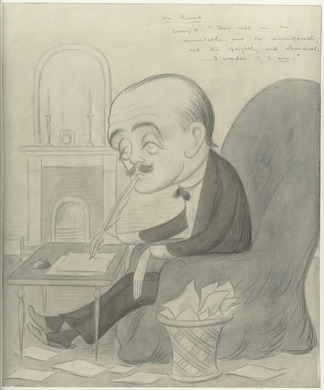‘Max Beerbohm: The Price of Celebrity’
New York Public Library
Manhattan
Has anyone alerted the Old Gray Lady — that is, of course, if it is still permissible to peg the New York Times as such — that there are caricatures afoot at Manhattan? The Times, you’ll remember, discontinued the inclusion of political cartoons back in the halcyon days of 2019. The reason? To further the cause of expressing “nuance, complexity and strong voices from a diversity of viewpoints across all of our platforms.”
What really happened is that “woke” members of the front office noticed that “visual journalism” — postmodernist newspeak for “the funnies” — traded in humor, and that humor typically involves exaggeration. It was deemed altogether too much to allow that sort of thing in those august pages. Daumier wouldn’t have lasted two days under this diktat. Thomas Nast? Out on his keister. There are many reasons to boycott the Times, and its active hand in quashing artistic freedom is one of them.
Admittedly, the caricatures found in “Max Beerbohm: The Price of Celebrity,” an exhibition at the main branch of the New York Public Library, are likely to strike contemporary audiences as somewhat mild. We do, after all, live in a culture that has seen the artform go to often extreme lengths — from the glory days of Mad magazine, the scathing distortions of “Spitting Image,” the race-based vaudeville of Robert Colescott’s paintings, and Drew Friedman’s obsessively rendered portraits of old Jewish comedians, cut-rate movie stars, and Barack Obama dressed as George Washington.
Ah, but the 1890s going into the early 20th century were kindler, gentler times in the United Kingdom. Or maybe not. Beerbohm (1872-1956) worried about the caustic nature of his drawings, a pursuit he began in earnest as a student at Oxford and for which he subsequently garnered significant renown.
In explaining his process, Beerbohm wrote that “the whole man must be melted down in a crucible and then, from the solution, fashioned anew. Nothing will be lost but no particle will be as it was before.” An art historian, Bernard Berenson, pegged him “the English Goya,” a description that oversells Beerbohm’s genial skills as a draftsman. That, and Beerbohm didn’t have an iota of misanthropy coursing through his dandified frame.

Via Mark Samuels Lasner Collection, University of Delaware Library, Museums and Press
Which isn’t to say that his portraits couldn’t sting. Oscar Wilde was an admirer — “The gods,” he averred, “bestowed on Max the gift of perpetual old age” — but did he ever put his eyes on Beerbohm’s renderings of him? His caricature of Wilde as a glutinous creature of Jabba the Hut-like proportions is on display in “The Price of Celebrity,” most notably in the form of Gerald Scarfe’s “thanx Max” homage, “I Have Nothing to Declare but My Flippancy” (circa 2002). The smaller Beerbohm sketches hanging nearby are not much kinder. One of them is feral.
It helps, of course, if you’re familiar with the subjects who strayed into Beerbohm’s purview. This observer laughed out loud upon coming across “Mr. H.G. Wells Foreseeing Things” (1931), wherein the ardent socialist and free-love advocate is pictured as a doughy milquetoast sheepishly considering the shape of things to come. “Mr. Whistler” (circa 1908) renders the fashion-conscious aesthete as a sneaking vulpine predator. As for Beerbohm’s portrait of the Irish playwright George Bernard Shaw, you don’t need to know its subtitle to glean the overstuffed arrogance at the core of the drawing. The sub-title? “Capitalist.”
Among the finest of Beerbohm’s caricatures, as co-curators Margaret D. Stetz and Mark Samuels Lasner remind us, were those of himself. “Un Revers” (circa 1909) sees Beerbohm at his desk with his expansive pate, fatigued sloe-eyes, and a wastebasket overflowing with abandoned writings. “Sometimes,” quoth Beerbohm, “I feel that I am a natural born genius in a field of human endeavor that hasn’t been invented yet.”
As “The Price of Celebrity” does much to underline, that endeavor was the creation of Max Beerbohm himself. The resulting exhibition is a welcome delight.
